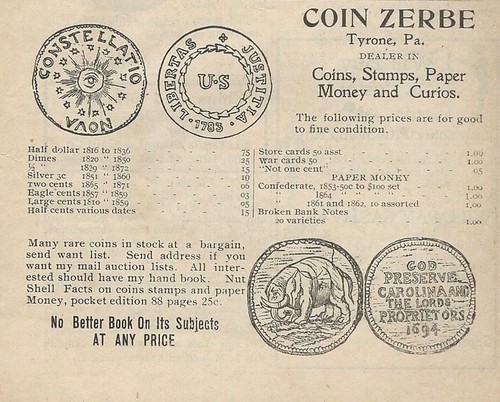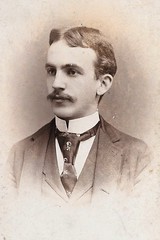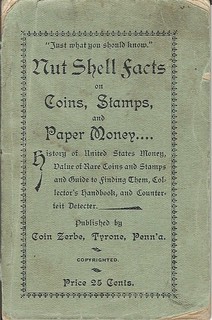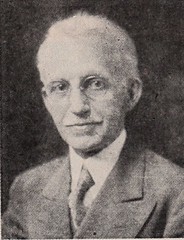
PREV ARTICLE
NEXT ARTICLE
FULL ISSUE
PREV FULL ISSUE
JOSEPH FARRAN ZERBE (1871-1949)
John Lupia submitted the following information from his Encyclopedic Dictionary of Numismatic Biographies for this week's
installment of his series. Thanks! As always, this is an excerpt with the full article and bibliography available online. This week's
subject is the legendary numismatic showman and ANA President Farran Zerbe. -Editor
He was educated in public and in private schools. He was a newspaper delivery boy for the Tyrone Daily Herald from 1880 to 1889.
As the legendary story goes when at age eleven in 1882 a customer paid him in a French 50 centimes pièce, which was refused as a
cash deposit by his local bank. This, purportedly whet his curiosity setting him on a course into the study of foreign numismatics.
On January 25, 1889, it was reported in his local newspaper that our coin crank narrowly escaped being run over by the cars on Spring Street, Tyrone, Pennsylvania. At this time he owned a stationery store, the "Zerbe Cycle Co.", Books, Stationery, Pianos, Organs, Toys, Music, Art Materials, Bicycles, Sporting Goods, and Musical Instruments, on the corner at 1123 Pennsylvania Avenue, Tyrone, Pennsylvania. He sold just about everything marketable in that store and ran seasonal ads at Christmas vending toys, candies, and various items for stocking stuffers. In 1893, according to his nephew Jerome McAvoy, Farran Zerbe exhibited his collection of Moneys of the World at the "Columbian Exposition" Chicago World's Fair, Chicago, Illinois, and was in charge of the government exhibit on the commemorative coins issued for the occasion : Isabella Quarter and Columbus Half Dollar, and according to several numismatists Zerbe both publicized and sold them. He joined the ANA on July 25, 1900 and is Member No. 197. On April 2, 1900 he bought $50.00 in coins from S. H. & H. Chapman and gave them his want list. He bought and sold paper money. According to Zerbe in an interview "since he was nine years of age he has been a collector of rarities" i.e., in 1880, so ran the story in The Pittsburgh Press, Wednesday, March 11, 1903, page 6. The story relates that he was en route to Saint Louis to register for his exhibit in March 1903 proposing to exhibit a fictional billion dollar gold piece 40 feet in diameter and 30 inches thick. Many of his coins and stamps and paper money are enumerated in this must read story. In 1904 the ANA elected him as first vice-president. From that first ANA convention for him that year he would attend 27 more during his lifetime, about 71 per cent of the 38 held up to 1941 when he became too feeble to travel. He was also a member of the British Numismatic Society of London. In 1906 he was in San Francisco during the earthquake and serendipitously helped save J. C. Lighthouse's coin collection. As the story goes Zerbe begged Lighthouse to examine his collection stored in the vault at the Palace of Art. Lighthouse took the coins out and brought them to Zerbe at his [Lighthouse's] home. He spent the entire day examining the coins and very fortunately too late to return them to the vault, which the following morning was ruined by the earthquake and fire. 
In 1907 he was elected president of the ANA. Consequently, he served as the 7th President of the ANA from September 4, 1907-August 14, 1909. He was an itinerant exhibitor an lecturer of "Moneys of the World" 1907-1914, and 1920-1928, which terminated upon the sale to Chase National Bank. In 1907 he began the traveling exhibit circuit publishing Money Talks, as a promotional pamphlet about the exhibition given out in the various banks which held the exhibit. At these exhibitions he also gave free booklets titled Money Facts bearing the imprint of the Bank where the exhibit was held. In 1908, he purchased The Numismatist from the estate of the late Dr. George Heath. Zerbe became the owner, editor and publisher of The Numismatist 1909-1910. On Wednesday, May 6, 1908, he married an older woman named Bessie Garner Knox (1862-1935), of Freehold, New Jersey, at Trenton, New Jersey. The Altoona Tribune and the Tyrone Daily Herald reported that Zerbe was living at Columbus, Ohio at the time. The romance began during the Louisiana Purchase Exposition. In June 1908 he and his new bride traveled to Cumberland, Maryland to exhibit his Moneys of the World at the Third National Bank. Zerbe's seminal work on the "Lesher Referendum Pieces" was published in the American Journal of Numismatics Volume 51, 1919. Without permission or consultation whatsoever B. Max Mehl reprinted this work in his own periodical, Mehl's Numismatic Monthly, May issue, setting off a private war. Both the ANS's and Zerbe's good nature quickly forgave the peccadillo of Mehl who was earnestly contrite. In July 1926, Zerbe published his chef d'oeuvre, a profusely illustrated seventy-page essay in The Numismatist listing over 140 different medals and tokens partially relating to the Bryan Satirical Pieces during Bryan's Campaigns of 1896 and 1900, some of which are called the Bryan Money and Bryan Dollars. In 1928, he sold his traveling "Money of the World" collection and library to Chase National Bank, New York, forming The Chase National Bank Collection of Moneys of the World Museum and as its founder being appointed the museum's first curator. Among the more notable American coins were Willow, Oak and Pine Tree New England Shillings of 1652, an 1804 U.S. Silver Dollar, a 1792 patter quarter dollar, and a 1709 Colonial Bill of Credit of New York printed by William Bradford. In August 1939 he retired as curator of The Chase National Bank Collection of Moneys of the World Museum. His successor was Vernon L. Brown in 1939, who was hired by him in 1931.
He fell ill in October 1949 and was confined to bed. He died at New York, on Sunday, Christmas Day, December 25, 1949, just a few months short of turning 79. Zerbe never cared about praise for his research and work and from this spirit of modesty submitted many articles for publication in The Numismatist signed by a pseudonym, being a punster "one of his favorites being "Portuguese Joe". The double entendre pun referring to the character in Robert Louis Stevenson's In the South Seas, and numismatically the famed Portuguese Johannes series of gold coins (1722-1835), commonly called a Portuguese Joe. In 1955 when the bank merged with the Bank of Manhattan to form The Chase Manhattan Bank the museum name also changed to The Chase Manhattan Moneys Museum. It moved to the Rockefeller Center Tourist Complex. By February 1978 the Chase collection was loaned to the Smithsonian. THe ANS was slated to receive some of the rare coins including the 1804 Silver Dollar. But in December 1979 the Zerbe-Chase Manhattan Collection was gifted to the Smithsonian.
Be sure to read the complete article online for a discussion of Zerbe's "French Coin" origin story, commemorative coin
sales, and Herbert A. Brand's tale about Zerbe's chance to buy a Denver, Colorado, banker's gold hoard, and much more.
-Editor
The Denver hoard story comes from an article by Herbert Brand in the may 1958 issue of The Numismatist, titled "Incident in the Life of Farran Zerbe." John Lupia adds: Yes, a very neat story indeed! When I first read it my heart was pounding with excitement until it came to the part where Zerbe went to the bank the next day and got the part about mother at dinner! It may be true, but unless a hoard of private gold surfaced out in the Denver area in the past 58 years there is no way of knowing the veracity of the story.
American Numismatic Association members can read the original article in the ANA's Numismatist archive; others can check out
the summary in John's bio of Zerbe. -Editor
To read the complete article, see:
Wayne Homren, Editor The Numismatic Bibliomania Society is a non-profit organization promoting numismatic literature. See our web site at coinbooks.org. To submit items for publication in The E-Sylum, write to the Editor at this address: whomren@gmail.com To subscribe go to: https://my.binhost.com/lists/listinfo/esylum All Rights Reserved. NBS Home Page Contact the NBS webmaster 
|


